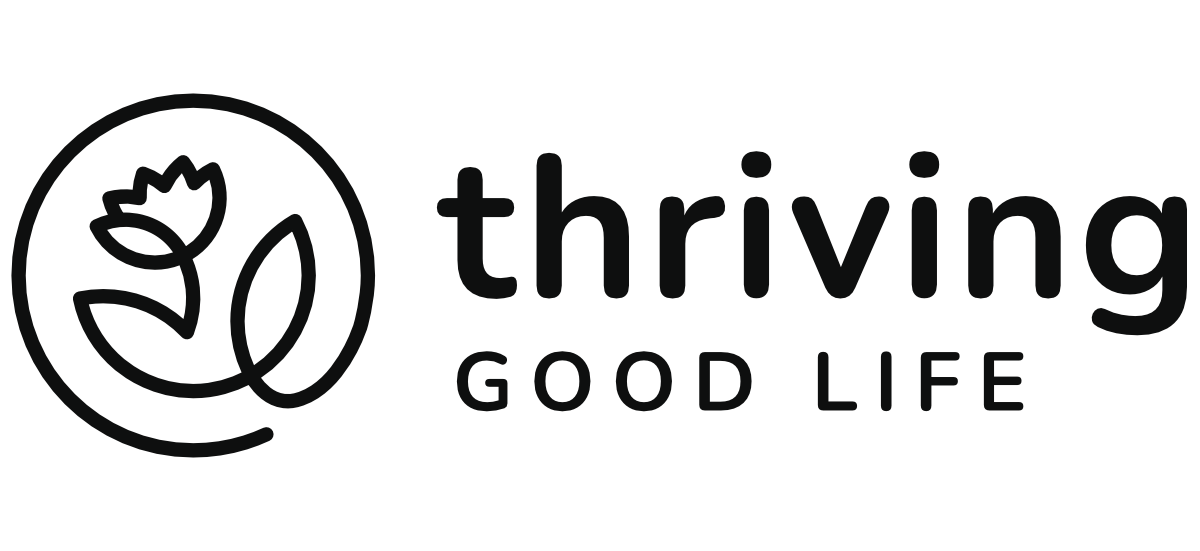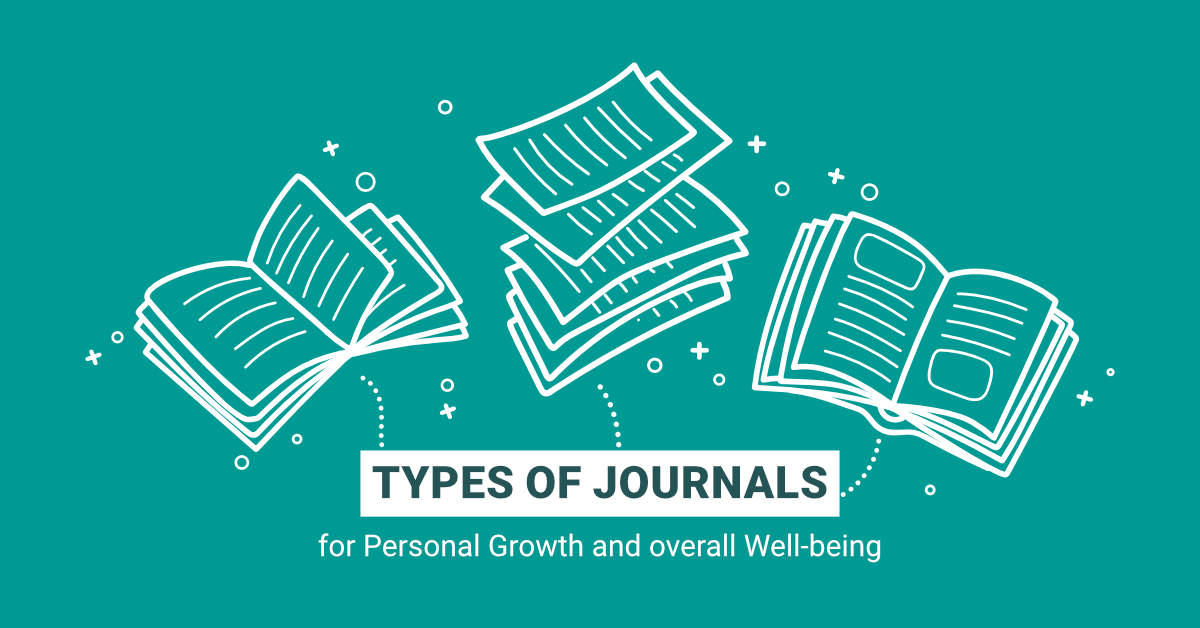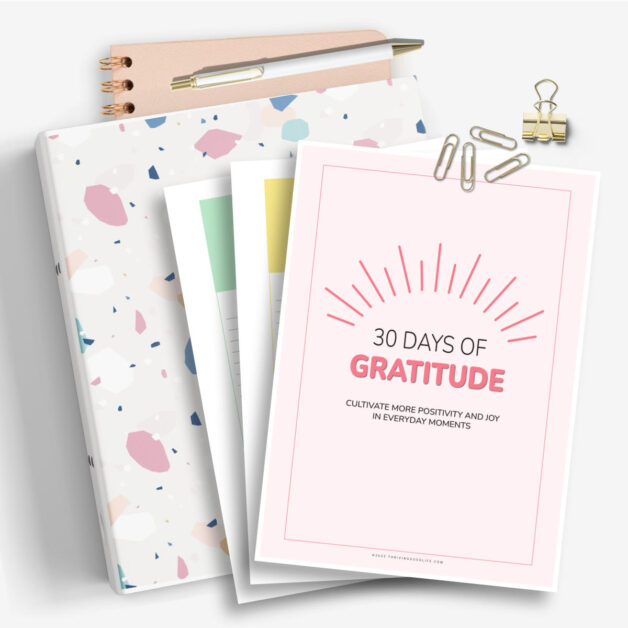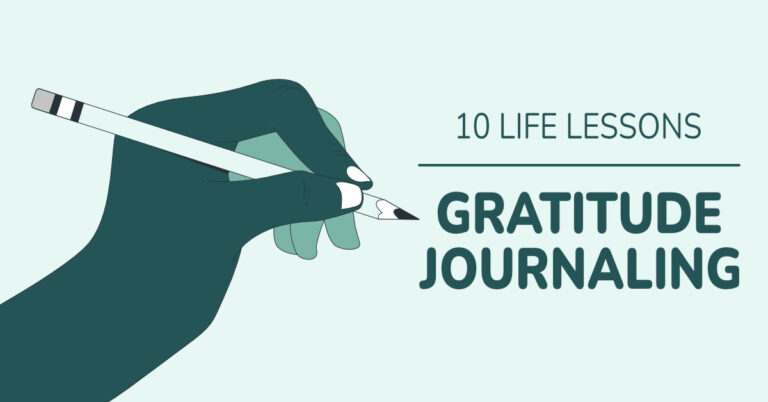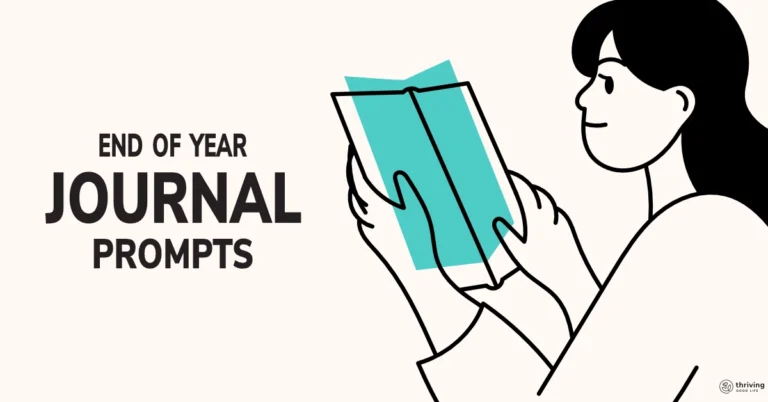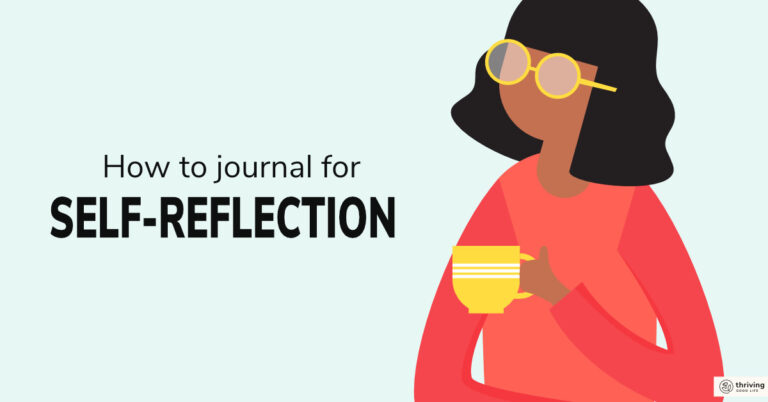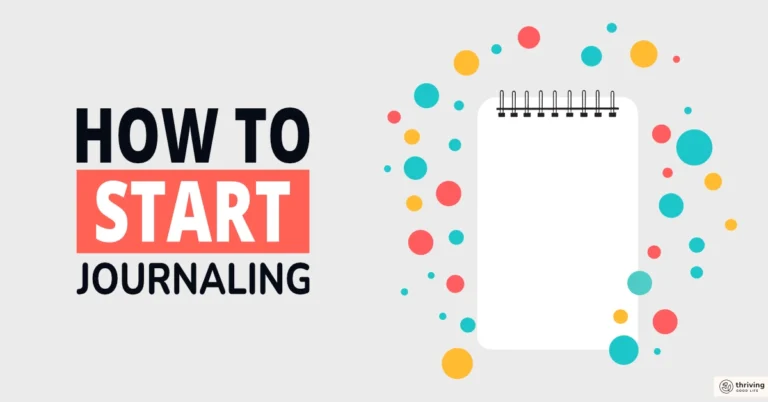Thinking about keeping multiple types of journals?
It makes sense. Well, for someone who likes to categorise stuff, that is.
I take it that’s you?
When I first started journaling I kept things simple.
I had one journal for all the things. But I soon realised that ‘all the things’ didn’t always fit neatly into one journal. And what I had growing in this one chunky notebook was a hodgepodge of unorganised musings.
That’s when I started dabbling with multiple journals.
I now have 5 different types of journal – one for big life goals, one for health and fitness, one for jotting down ideas, one for keeping track of quotes and random sayings, and one for reflection and processing my thoughts, feelings, and emotions.
This journaling system works for me, and I suspect it’ll work for you too.
In this article I share 20 types of journals you can use to keep your mind, and various areas of your life organised.
20 Different Types of Journals
1. Guided Prompt Journal
There are those times when you open your journal, and you don’t know what to write. You stare at the blank pages. You’ve got nothing.
It’s moments like these where you’ll appreciate a little extra guidance.
A guided prompt journal is like having a conversation with a close friend. But the friend is inside your journal. They supply the prompts, in the form of questions, and one-liners. You respond by writing down your answers.
These prompts can be fun, open-ended questions like: “If you could have one superpower, what would it be?” Or prompts that inspire deep reflection, such as: “What can I learn from the last mistake I made?”
You’ll can find various guided prompt journals that focus around specific themes, such as self-discovery, love, or gratitude, to name a few.
2. Gratitude Journal
It’s easy to get stuck in a negative loop when we’re bombarded with bad news every day. But a simple practice like gratitude journaling can help you find the silver lining when everything seems to be going wrong.
You don’t need to write a lot in a gratitude journal.
Simply jot down three things you’re grateful for each day.
This could be something as simple as getting the perfect cappuccino from your favourite coffeehouse. Or receiving a lovely compliment from your usually miserable boss.
Or discovering a new funny animal video on your favourite YouTube channel.
Having a daily reminder of what’s good in your life can help you see the big picture when the world seems to be conspiring against you.
3. Dump Your Junk Journal
We carry a certain amount of junk in our mental trunks.
You know, thoughts, feelings, and emotions that hold us back from experiencing real growth as individuals. And the problem is if we don’t let go of that clutter, it’ll stop us from living the life we want to live.
The Dump Your Junk Journal is a useful tool to help you release patterns of thinking that don’t serve you in a healthy way.
All the things you need to let go of, stick them in here. Clear out that mental junk and make space for more positive energy and experiences.
4. Letters From the Heart Journal
The idea behind this type of journal is to express yourself in letter form to someone you have interacted with in the past. It’s a safe way to deal with emotions you want to let go of, or to offer a heart-felt thank-you.
Maybe you lost a friend from childhood and it’s playing on your mind. Maybe someone hurt you a few years ago, and you’re still holding on to the pain, anger, or resentment.
Or maybe someone inspired your life growing up, and you want to let them know how much that meant to you. This might be a loved one who passed away or someone you’ve never met.
You can even write to your future self.
The intention behind this type of journal isn’t to actually send the letter (although you can if you like). So write what you need to write freely, in an open, honest, and raw way.
5. Shared Journal for Couples
This type of journal is not only a fun couples’ activity, it’s a great way to keep track of everyday conversations, questions, thoughts, and feelings.
Record all the moments of your lives together: from mundane to magical, from silly to serious.
You can use couple journal prompts to deepen your connection, or simply journal about your love story, capturing all the special moments and milestones that make your relationship unique.
Related: How to start a relationship journal.
6. Self-Discovery Journal
Self-discovery is all about gaining insight into your own character. It’s like going on a journey to uncover the real you, so you can take stock of your life, and explore how best to live it.
A self-discovery journal will gently guide you through the uncharted territories of the mind, in a way that helps you understand yourself on a deeper level.
You can use self-discovery prompts to explore why you think or feel the way you do, and come up with ways to change things for the better.
This journal gives you a map for finding your true self and purpose in life.
7. Self-Compassion Journal
Self-compassion is about treating yourself with kindness, understanding, and respect whenever you make a mistake. In the same way you would treat others you care for.
If a friend came to you crying because they messed up at work, you’d probably say something along the lines of:
“It’s okay! You’re human. Everyone makes mistakes”.
But it can be hard to extend the same courtesy to ourselves. This is where a self-compassion journal can help. It’s a place where you can respond to yourself with kind words and patience.
8. Forgiveness Journal
Use this journal to let go of feelings of pain, resentment, or anger surrounding an incident involving another person.
This ‘letting go’ doesn’t mean you’ve let the person who harmed you off the hook. It just means you’re learning how to release yourself from negative emotions, so you can re-direct your energy to something that serves you.
9. Self-Forgiveness Journal
Same as above, but the focus is on forgiving yourself for wrongdoings or mistakes, as opposed to forgiving others.
10. Grief and Loss Journal
A grief and loss journal is a tool to help you process your feelings and emotions around an ending.
Use this journal to write about a breakup, the loss of a job or pet, a death in the family, or any other major life changes causing you heartache.
You can write about:
- Your experience of going through the varying stages of grief.
- What you’re feeling and how you’re coping.
- What memories you have of a special person.
- What you miss most about them.
- What they contributed to your life.
- What you learned through this loss.
And anything else that feels like it belongs here.
11. Spiritual Growth Journal
You don’t need to be religious to keep a spiritual journal.
This type of journal offers a place for you to explore your relationship with a higher power. That could be God, if you’re a believer, or it could be the universe, or anything you consider to be greater than you.
Journal about the areas you want to work on. For example, maybe you’re trying to pray more, meditate more often, read more deeply.
Then record how it went — were you able to fulfil your spiritual obligations? Did anything interesting happen? What wisdom did you receive?
You can also explore how your relationship with this higher being evolves over time, and what you need in order to stay connected.
12. Memory Journal
A memory journal is essentially just what it sounds like—a place to jot down any memories that make you smile. It can be anything: your favourite childhood vacation spot, your first kiss, an inside joke with your bestie… anything that brings back good feelings when you think about it.
Science tells us that remembering our happiest moments, can be a powerful way to combat stress and depression 1, 2.
So start a memory journal.
Use it to record the BEST times of your life.
Reminiscing in this way will boost your mood, and reward you with an additional outlet for stress relief.
13. Mindfulness Journal
A mindfulness journal will help you practice being more present in your day-to-day life. And it does so by drawing your attention to moments, both big or small, that we might otherwise overlook.
For example;
What do you see around you right now?
What are your senses telling you?
By tuning into the present moment like this, you can focus more intently, without allowing distractions to cloud your mind.
You can see everything clearly, and because of this you can respond to what’s happening around you in more thoughtful ways.
Related: How to start journaling for mindfulness
14. Free-Writing Journal
Think of a free-writing journal as an open invitation to the wanderings of your mind. You can write whatever you want, whenever you want, however you want. No pressure. No rules.
It’s the perfect space to let your thoughts flow.
When you write in a free-writing journal, there’s nothing holding you back. You can be as silly, as serious, or as revealing as you need to be without the fear of being judged by anyone. It’s an opportunity for you to speak from the heart, freely and openly.
A free-writing journal is also a great place to practice creative writing. Or to drum up the inspiration for songs, poems, or even screenplays.
Related: How to start a journal – an ultimate guide for beginners
15. Commonplace Journal
How often do you come across a really good quote and either:
a) don’t write it down, or
b) write it down on a random bit of paper and forget where you wrote it.
What you need is a commonplace journal. It’s the place you dump random ideas and meaningful tidbits.
Fill this journal with quotes, song lyrics, sayings, anecdotes, affirmations, snippets from conversations, books and social media posts… poetry even.
The next time you’re in need of a mental boost, crank open your journal. Breathe in the notes of wisdom and ideas that inspire and motivate you to keep going.
16. Reading Journal
Do you have a hard time remembering all the books you’ve read?
The different characters, plot points, and other important details that come up through the course of a novel.
Then you’d benefit from starting a reading journal. Use it to keep track of important notes, observations, thoughts, and feelings as you read.
It’ll help you focus on the text, as well as organise the information better.
17. Learning Journal
Here are a few reasons to keep a dedicated learning journal:
1) Retain information. Capture all those ideas and inspiration coming at you from workshops, online classes, lectures, and other educational sources. That way you won’t lose or forget key learning points.
2) Space for reflection. You’ll do well to reflect on what you’ve learned, or are learning. Write down answers to these questions: What did I learn through this process? What were my challenges? How can I improve?
3) Increase motivation. By reviewing your journal you’ll be reminded of what you’ve achieved and how far you’ve come. Which may boost your desire to continue learning, maybe taking on bigger challenges.
18. Goals Journal
You know the feeling when you set a goal (lose 10lbs, run a marathon, travel the world) but then life happens and it just… doesn’t work out.
It’s so easy to feel like giving up and saying:
“I guess this wasn’t meant to be”.
But the truth is, your goals are always within reach. As long as you keep taking baby steps towards them.
A goals journal will help you turn your desires into actionable steps, and allow you to track your progress in a way that feels attainable. You can use this type of journal to keep you focused and motivated as you work toward your goals, and plans for the future.
19. Money Journal
People use money journals for a variety of reasons, from tracking what they spend to mapping out their budget, to setting financial freedom goals. Whichever way you choose to use a money journal, the underlying goal is always the same: to create a better relationship with your money.
Keeping a money journal is an excellent way to get in touch with your feelings and emotions around spending. Which will help you catch things like spending for comfort, or living beyond your means.
20. Health & Fitness Journals
These types of personal journals will help you manage aspects of your physical health and general well-being.
For example, if you’re trying to lose weight and get in better shape, you can use a food journal to log your food and water intake, along with your mood, and the amount of sleep and exercise you’re getting.
Likewise, if you want to build muscle, you can use a dedicated fitness journal to record the weights you lifted, the reps you did each set, and the rest time between sets.
So, What Type of Journals Are Right for You?
Any or all of the above.
I know, that’s a cop out. But if you’re not sure, start by experimenting.
Pick a journal type, test it out. You’ll find ones that work for your unique needs and desires, and ones that don’t.
Good luck my friend.
Footnotes:
- Speer, M. E., & Delgado, M. R. (2017). Reminiscing about positive memories buffers acute stress responses. Nature Human Behaviour, 1(5). https://doi.org/10.1038/s41562-017-0093
- Askelund, A. D., Schweizer, S., Goodyer, I. M., & van Harmelen, A.-L. (2019). Positive memory specificity is associated with reduced vulnerability to depression. Nature Human Behaviour. https://doi.org/10.1038/s41562-018-0504-3
